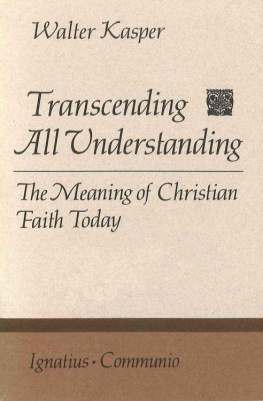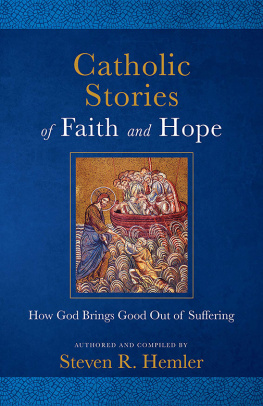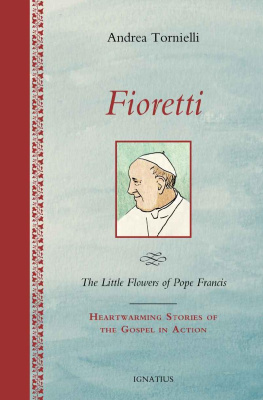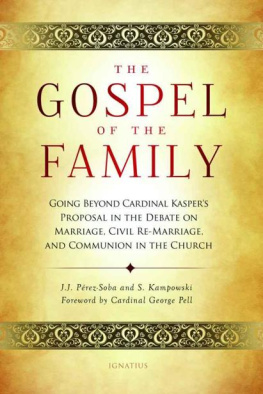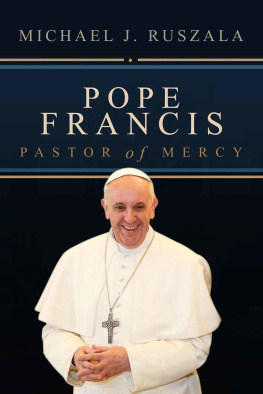Mercy
The Essence of the Gospel and the Key to Christian Life
Cardinal Walter Kasper
Translated by William Madges

Paulist Press
New York / Mahwah, NJ
The Scripture quotations contained herein are from the New Revised Standard Version: Catholic Edition, Copyright 1989 and 1993, by the Division of Christian Education of the National Council of the Churches of Christ in the United States of America. Used by permission. All rights reserved.
Jacket photos courtesy of the author.
Dust jacket design by Amy C. King
Book design by Lynn Else
Copyright 2013 by Walter Cardinal Kasper/Kardinal Walter Kasper Instituts fr Theologie, kumene und Spiritualitt
Translation copyright 2014 by Paulist Press
All rights reserved. No part of this publication may be reproduced, stored in a retrieval system, or transmitted in any form or by any means, electronic, mechanical, photocopying, recording, scanning, or otherwise, except as permitted under Section 107 or 108 of the 1976 United States Copyright Act, without the prior written permission of the Publisher. Requests to the Publisher for permission should be addressed to the Permissions Department, Paulist Press, 997 Macarthur Boulevard, Mahwah, NJ 07430, (201) 825-7300, fax (201) 825-8345, or online at www.paulistpress.com.
Library of Congress Control Number: 2014930852
ISBN 978-0-8091-0609-7 (hardcover)
ISBN 978-1-58768-365-7 (e-book)
Published by Paulist Press
997 Macarthur Boulevard
Mahwah, New Jersey 07430
www.paulistpress.com
Contents
Cardinal Walter Kaspers book, Barmherzigkeit, was published in Germany in 2012, one year before the election of Jorge Mario Bergoglio to succeed the retired Pope Benedict XVI. In many ways, the central themes of this book prefigure key elements in Pope Franciss vision of the churchs mission and his own pontificate. From the very beginning of his papacy, Pope Francis has emphasized mercy and compassion. In the homily he gave at the inauguration of his Petrine ministry, on the feast of Saint Joseph (March 19, 2013), Pope Francis used the example of Joseph, as the protector of Mary and Jesus, to exhort Christians and all others to be protectors of one another and the environment. The vocation of protector, he said, means protecting people, showing loving concern for each and every person, especially children, the elderly, those in need, who are often the last we think about. He continued:
Here I would add one more thing: caring, protecting, demands goodness, it calls for a certain tenderness. In the Gospels, Saint Joseph appears as a strong and courageous man, a working man, yet in his heart we see great tenderness, which is not the virtue of the weak but rather a sign of strength of spirit and a capacity for concern, for compassion, for genuine openness to others, for love. We must not be afraid of goodness, of tenderness!
A half year after his election, he gave an interview published in America magazine (September 30, 2013), in which he laid stress on the service of mercy as central to the churchs mission. I see clearly, Pope Francis said, that the thing the church needs most today is the ability to heal wounds and to warm the hearts of the faithful; it needs nearness, proximity. Calling upon the churchs leaders to be ministers of mercy above all, he laid out this vision for the church: I dream of a church that is a mother and shepherdess. The churchs ministers must be merciful, take responsibility for the people and accompany them like the good Samaritan, who washes, cleans and raises up his neighbor. This is pure Gospel.
Reproposing the gospel to those who had left the church or who were experiencing a crisis of faith was a special concern of Pope Benedict XVI. He had advocated, therefore, a new evangelization. Pope Francis has continued this mission, making mercy one of its important components. In his address to participants in the plenary of the Pontifical Council for Promoting the New Evangelization (October 14, 2013), Pope Francis declared:
We need Christians who make Gods mercy and tenderness for every creature visible to the men of our day. We all know that the crisis of modern man is not superficial but profound. That is why the New Evangelization, while it calls us to have the courage to swim against the tide and to be converted from idols to the true God, cannot but use a language of mercy, which is expressed in gestures and attitudes even before words.
In his first apostolic exhortation, The Joy of the Gospel (November 24, 2013), Pope Francis reiterated this point: The Church must be a place of mercy freely given, where everyone can feel welcomed, loved, forgiven and encouraged to live the good life of the Gospel (Evangelii Gaudium, 114).
For Pope Francis, the new evangelization entails renewed focus upon Jesus as the embodiment of Gods love and the exemplar of divine mercy. Jesus provides the example all Christians are to follow: To get diverted by many secondary or superfluous things does not help; what helps is to focus on the fundamental reality, which is the encounter with Christ, with his mercy and with his love, and to love our brothers and sisters as he has loved us.
In this book, Mercy: The Essence of the Gospel and the Key to Christian Life, Cardinal Kasper explores in depth the meaning of mercy and the role it must play in the life of the church and the world. He calls for rethinking the Christian understanding of God. Rather than understanding God primarily in metaphysical terms (Being Itself; all-knowing, all-powerful, etc.), as has been the case for most of the history of the church, Cardinal Kasper, drawing upon deep biblical roots, identifies mercy as Gods fundamental and defining attribute. He then describes the consequences for the praxis of the church and for the life of individual Christians entailed by this theological reorientation.
Beginning with a description of the pressing need for mercy in our contemporary world, Cardinal Kasper reviews how mercy is understood and articulated in philosophy, the Bible, and contemporary theology. The book explores the relationship between mercy and justice and describes the value and necessity of the spiritual and corporal works of mercy for church and society.
In translating, I have striven for accuracy, staying very close to Cardinal Kaspers German text, while also trying to make the translation as intelligible and readable as possible. Every translation, however, is also an interpretation. As other translators have acknowledged, it is sometimes very difficult to translate key terms the same way every time because the range of meanings of German words does not exactly match the range of meanings of the relevant cognate English words. The translator has to make choices based on his or her understanding of the authors intended meaning and the context.
It might prove helpful to the reader to offer here a few notes concerning some of the more important German terms, my translation of them, and their shades of meaning. German terms referring to the human attitudes and actions of mercy, pity, sympathy, and empathy occur regularly throughout Mercy: The Essence of the Gospel and the Key to Christian Life. Among the most frequent of these terms are Barmherzigkeit and Erbarmen. Virtually without exception, I have rendered both of those terms as mercy, although each could also be translated as compassion. Mitleid is another frequently recurring term, which I have usually rendered as compassion, although it could also be translated as mercy, pity, or sympathy. I have generally maintained consistency in translating Barmherzigkeit, Erbarmen, and Mitleid the same way in different contexts in order to accurately communicate the distinctive phenomenon Cardinal Kasper intended to describe in the respective contexts. Mercy, pity, sympathy, and compassion are closely related terms. For this reason, I have inserted the German word in brackets where I thought it would make clearer the specific meaning Cardinal Kasper intended.
Next page


